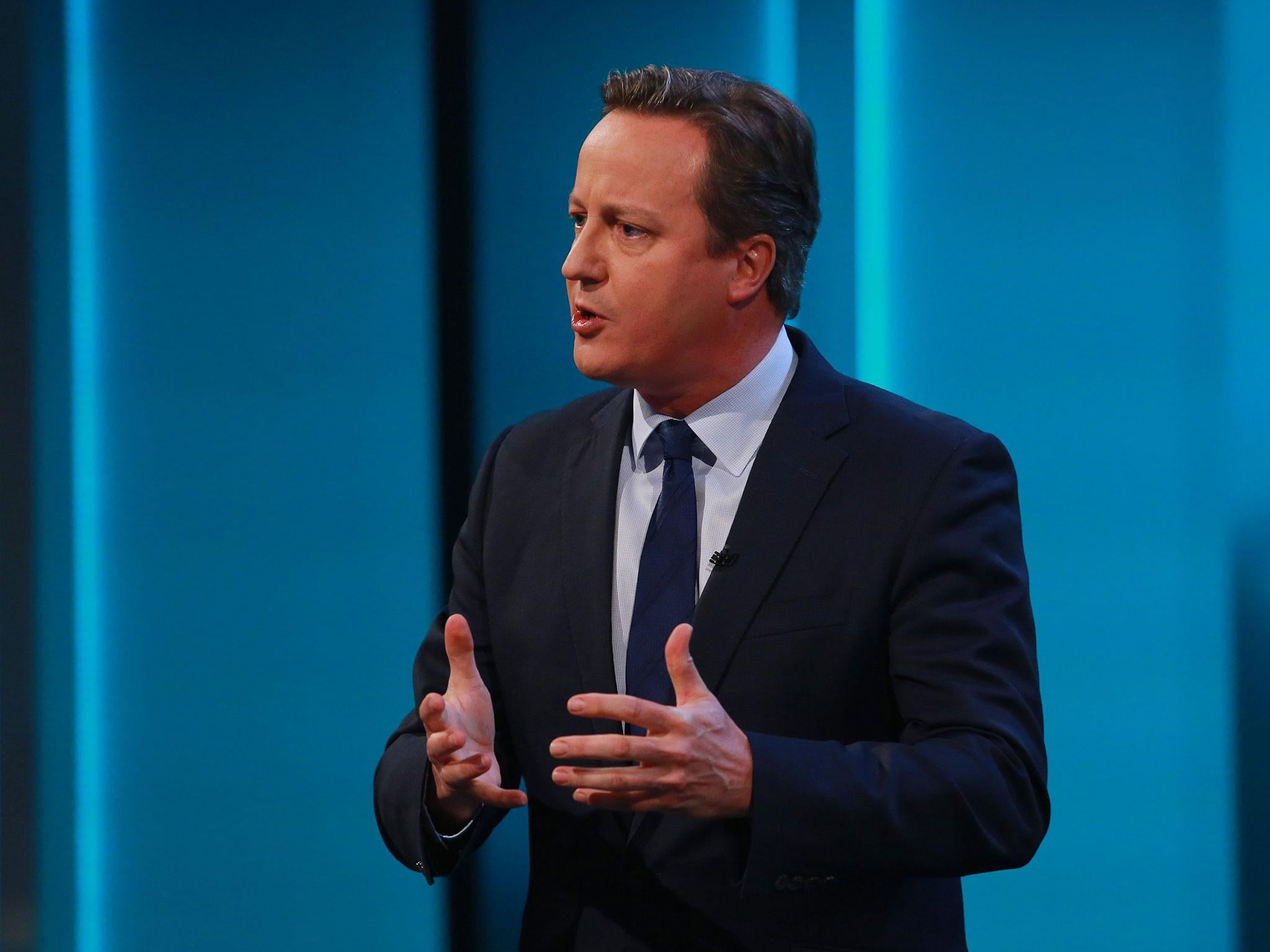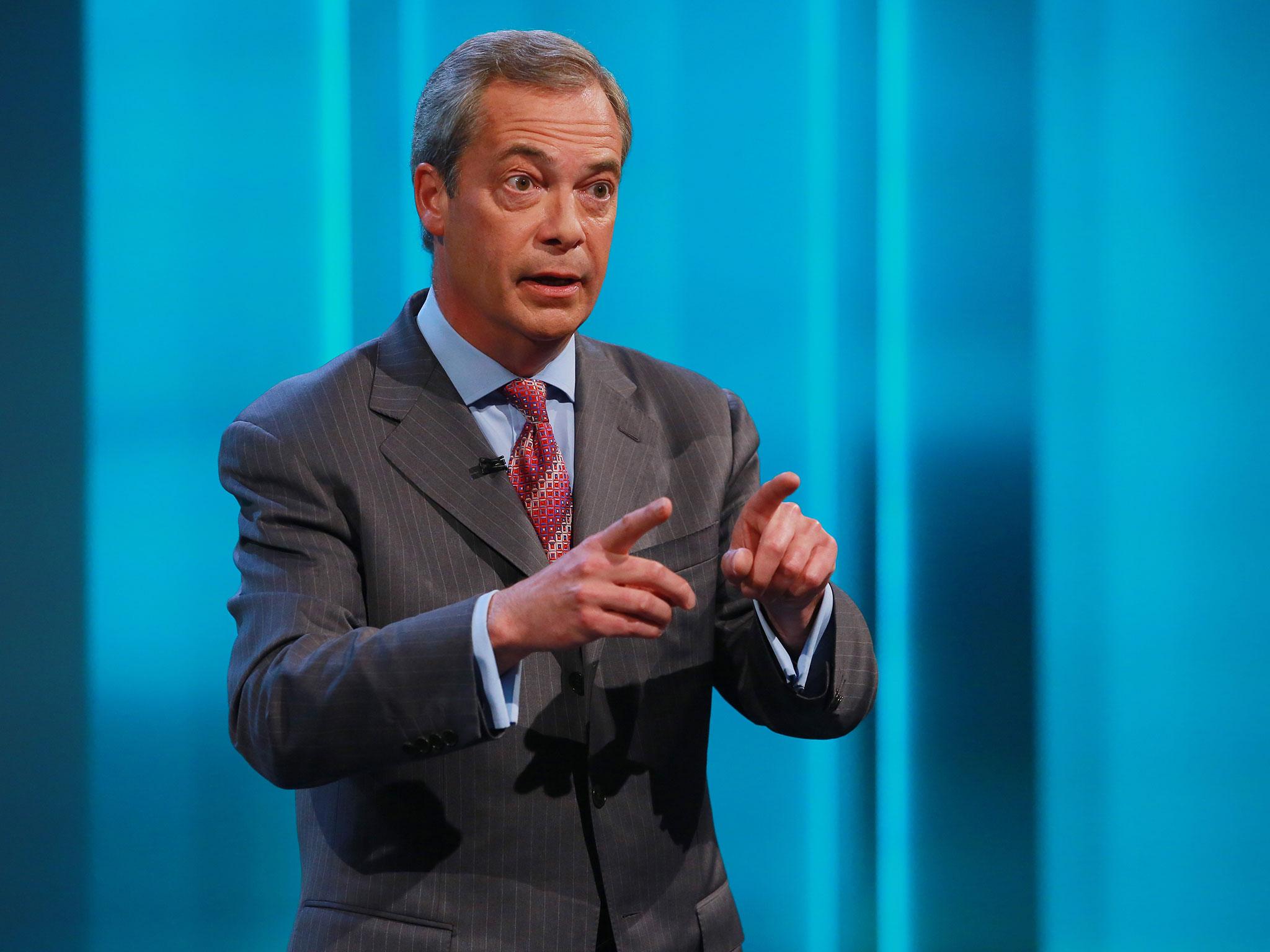EU referendum: David Cameron and Nigel Farage face questions on sovereignty and the economy during live TV event
The Prime Minister and Ukip leader Nigel Farage faced questions from a studio audience

Your support helps us to tell the story
From reproductive rights to climate change to Big Tech, The Independent is on the ground when the story is developing. Whether it's investigating the financials of Elon Musk's pro-Trump PAC or producing our latest documentary, 'The A Word', which shines a light on the American women fighting for reproductive rights, we know how important it is to parse out the facts from the messaging.
At such a critical moment in US history, we need reporters on the ground. Your donation allows us to keep sending journalists to speak to both sides of the story.
The Independent is trusted by Americans across the entire political spectrum. And unlike many other quality news outlets, we choose not to lock Americans out of our reporting and analysis with paywalls. We believe quality journalism should be available to everyone, paid for by those who can afford it.
Your support makes all the difference.David Cameron has admitted that “forecasters don’t always don’t get it right” as he was challenged on claims of economic Armageddon if the UK pulled out of the European Union.
Mr Cameron also raised the prospect of a second Scottish referendum if England voted to leave the European Union while Scotland voted to remain.
“I do worry about a second Scottish referendum if we vote to leave,” he said.
Mr Cameron faced tough question from an ITV studio audience in a televised debate with the Ukip leader Nigel Farage.
But he insisted that the UK would be worse off if Britain were to leave the European Union rather than to remain.
“Frustration with an institution are not a justification for walking away,” he said.
Mr Cameron also insisted that UK would remain sovereign even if the UK voted to remain in the EU but added that a vote to leave would damage Britain’s economic prosperity.
“We are engaged in the greatest act of sovereignty for many years,” he said. “If you love your country you do not damage its economy.”
Mr Cameron also offered a fig leaf to Tory anti-Europeans saying that “people’s individual careers should not get caught up in this referendum” hinting that Leave campaigners such as Boris Johnson would have big Cabinet roles regardless of the vote later this month.

Responding to the Ukip leader Nigel Farage, who appeared earlier in the programme, Mr Cameron urged voters not to cast their ballot on purely domestic concerns.
“Don’t take the Nigel Farage little England option,” he said.
But speaking before Mr Cameron the Ukip leader said the European Union was “done for” saying the “money had run out” and migration crisis had been a “nightmare”.
He dismissed claims from the studio audience that trade would suffer if the UK pulled out of the European Union saying that any renegotiation of Britain’s relationship would be better than the current deal.
“No deal is better than the rotten deal that we’ve got at the moment,” he said.
He also dismissed threat by senior European figures that Brexit would disadvantage Britain in the future.
“We’re British, we’re better than that,” he said. “We’re not going to be bullied by anyone let alone the unelected Jean Claude Junker.”
The debate came after a day of political drama in which Mr Cameron launched an extraordinary attack on his Cabinet colleagues Michael Gove and Boris Johnson accusing them of telling “total untruths” to “con” the public into voting to leave.
Amid signs of deep concern in the Remain camp that momentum is gathering behind a vote to leave Mr Cameron ripped up his “self-denying ordinance” not to attack fellow Tories to accuse his colleagues of “peddling nonsense”.
In response Mr Gove and Mr Johnson challenged the Prime Minister to a “face-to-face” debate so voters could “judge for themselves” which sides arguments were more accurate.
Mr Cameron’s intervention ahead of his ‘debate’ with Nigel Farage was widely interpreted as a response to fears in the Remain campaign that they are losing control of the campaign following a week that has been focused on immigration and crime – both strong areas for Vote Leave. Mr Cameron said he only decided to call the press conference while watching the news coverage of the debate on Monday night.
Perhaps taking a leaf out of his former election strategist’s Lynton Crosby’s playbook of what he once described as “throwing a dead cat on the table” Mr Cameron attempted to move the debate back on the economy by launching a strong and personal on his Cabinet colleagues.
“The Leave campaign (is) resorting to total untruths to con people into taking a leap in the dark,” he said.
“It's irresponsible and it's wrong and it's time that the Leave campaign was called out on the nonsense that they are peddling.”
He accused the Brexit side of “complacency and nonchalance” about the consequences of EU withdrawal, after senior spokesmen including Justice Secretary He accused the Brexit side of “complacency and nonchalance” about the consequences of EU withdrawal, after senior spokesmen including Justice Secretary Michael Gove suggested voters should dismiss the assessment of economic experts.
Mr Cameron asked whether you would build a bridge or a house without expert advice and then said that warnings about the repercussions of Brexit from experts including the World Trade Organisation, the chairman of the US Federal Reserve amounted to a “reality check” for voters.
He added that in the past few days alone Vote Leave had made untrue claims that Britain could be liable for future bailouts of eurozone states and could lose its rebate and its veto powers; could be forced to increase its contribution to the EU budget and be powerless to stop the creation of an EU army. And he said that Vote Leave estimates of the money that could be saved by quitting the 28-nation bloc were contradicted by “every credible economic organisation”.
He said: “Credible experts warning about risks to our economic security on one side and a series of assertions that turn out to be completely untrue on the other.”
In a message to voters about the importance of the June 23 vote, Mr Cameron said: “It matters for your job, it matters for the prices that you pay in the supermarket each week, it matters for the mortgage you pay or your chances for getting on the housing ladder, it matters for your pension, it matters for the price of your family holiday, it matters for the money that we have available to spend on your local hospital or your local school.
“And it matters for your children and your grandchildren, the kind of opportunities that they will have and the kind of country that they will grow up in.
“All of this depends on the strength of our economy and I believe - along with this collection of independent experts - that our economy is stronger inside this organisation.
”So listen to the experts. Don't stand on the sidelines. This matters for you. There are no second chances, no re-runs. So register to vote and vote Remain on June 23.”

The EU referendum debate has so far been characterised by bias, distortion and exaggeration. So until 23 June we we’re running a series of question and answer features that explain the most important issues in a detailed, dispassionate way to help inform your decision.
What is Brexit and why are we having an EU referendum?
Will we gain or lose rights by leaving the European Union?
What will happen to immigration if there's Brexit?
Will Brexit make the UK more or less safe?
Will the UK benefit from being released from EU laws?
Will leaving the EU save taxpayers money and mean more money for the NHS?
What will Brexit do to UK trade?
How Brexit will affect British tourism
What will Brexit mean for British tourists booking holidays in the EU?
Will Brexit help or damage the environment?
Join our commenting forum
Join thought-provoking conversations, follow other Independent readers and see their replies
Comments